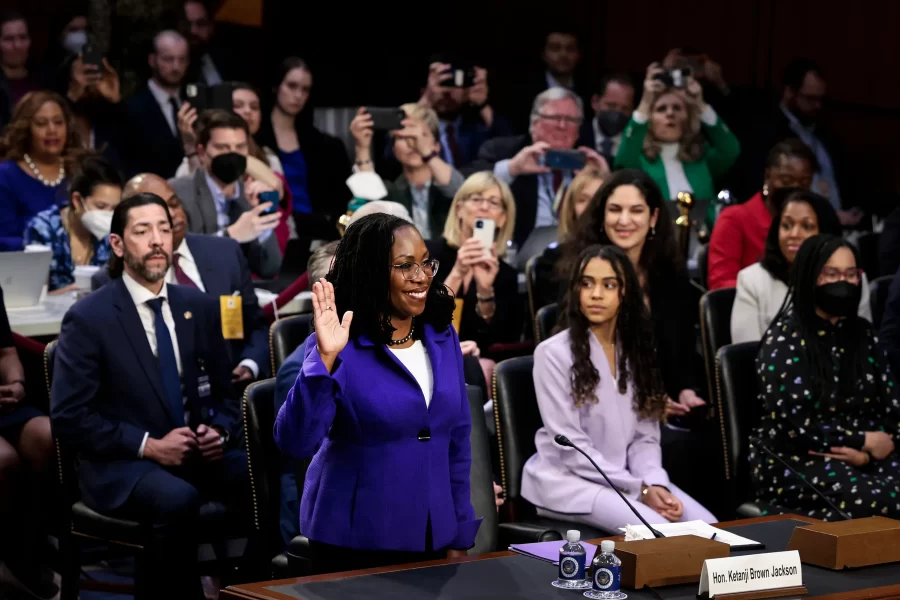SCOTUS Nomination Breaks Glass Ceiling
Judge Ketanji Brown Jackson’s nomination to the U.S. Supreme Court is a step forward for representation within the judiciary.
March 30, 2022
It took 223 years, but a Black woman, Judge Ketanji Brown Jackson, is on the cusp of getting a seat in the Supreme Court. This is a triumph for all of America.
“It’s time that we have a court that reflects the full talents and greatness of our nation with a nominee of extraordinary qualifications,” President Joe Biden said when he nominated her last month.
Jackson stood out in her hearings. It was heartening to hear her express her devotion and love to what many believe to be a flawed America. This triumph is well-deserved after years of service as a public defender and her devotion to the law. But the attitudes of right-wing senators have cast a shadow over her work and this great triumph.
The first words from Tennessee Senator Marsha Blackburn were staggering, yet unsurprising. They showed the scope of what Jackson was up against. Republican Senators Josh Hawley, Ted Cruz and Lindsey Graham took aim at her sterling work and reputation, characterizing her in an untrue and hurtful narrative of a woman unfit to serve.
Hawley went so far as to tweet, “Judge Jackson has a pattern of letting child porn offenders off the hook.” Cruz attacked Georgetown Day School, where Jackson is one of the board of trustees, for a book it reads to young children.
In most ways, she fits the profile of justices before her as a Harvard-educated and admired federal judge. She would be the eighth justice to have graduated from Harvard College and Harvard Law in the history of the court.
In the first minutes of the hearing, it was obvious it was her race and gender, rather than legitimate questions about her qualifications, that had prompted these disgraceful attacks.
Right-wing Senators do not have the power or the votes to stop Jackson from becoming a Justice. Their attacks towards her character and values are untrue and they suggest an uglier truth– some conservatives do not believe a Black woman should be given a seat in our courts.
Even before Jackson was selected by Biden, there were attacks from the right. Complaints were largely rooted in the fact that Biden had pledged to give a seat to a Black woman. They said it was akin to a “quota” or “affirmative action,” though former presidents Ronald Reagan and Donald Trump have taken similar pledges of giving seats to women.
Left-wing senators were pleased to welcome Jackson to the Supreme Court.
“Today we should rejoice,” Senator Cory Booker said, shining a light on what a triumph it would be for a Black woman to be on the Supreme Court.
Of the 115 justices in our history, all but seven have been White men, and we have had only two Black men – Thurgood Marshall and Clarence Thomas.
If Jackson becomes a Justice, the court’s make-up would be striking. It would have four White men, a Black man, and four women – one Black woman and one Hispanic woman. This still does not accurately represent America, but it would be a step forward.
In all of this, the Republicans were hung up on the past hearings of Justice Brett Kavanaugh, during which Kavanaugh was accused of sexually assaulting a woman in high school.
“No one is going to inquire about your teenage drinking habits,” Cruz joked.
But Jackson fought through it. She sat in her chair with poise and patience.
Despite his insistent disrespect, no words from Cruz could take away the first twenty minutes of the hearing.
“I know it has not been easy as I have tried to navigate the challenges of juggling my career and motherhood,” Jackson said to her daughters in her opening remarks. “And I fully admit that I did not always get the balance right. But I hope that you have seen that with hard work, determination and love, it can be done.”
It is likely that many women saw themselves in that statement and felt a sense of trust towards Jackson. With an appointment in sight, she was vulnerable and honest, fearless in a way that spoke to women in this country.
In the end, it was her qualification and story that shone through. From a young Black girl in Miami to a federal judge, one could not help but be in awe of Judge Jackson.










